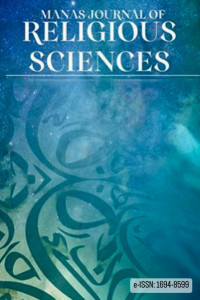İmam-ı Nevevî’nin Riyazü’s-Salihîn Adlı Eserindeki Ahlâk Konulu Hadislerin Değerler Eğitimi Açısından Tahlili
Abstract
Değerler eğitimine olan ihtiyacın gün geçtikçe artması, din eğitimcilerinin dikkatini çekmekle beraber bu alandaki çalışmalar gün be gün ivme kazanmaktadır. Bu çalışmada hadis kitapları arasında önemli bir yere sahip olmasının yanında oldukça da yaygın olan, kaynak eser olarak da kabul edilen Nevevî’ye ait Riyâzü's-Salihîn adındaki hadis kitabında yer alan ahlak içerikli hadisleri kritize edilmiştir. Çalışmada amaç, söz konusu eserdeki ahlaki konuları işleyen hadislerin rivayet şeklinde hangi metotlara ağırlıklı olarak başvurulduğunu ortaya koymaktır. Yapılan inceleme sonucunda hadislerde, anlatım, örnek olay incelemesi, soru cevap ve nasihat etme metotlarının kullanıldığı tespit edilmiştir. Hz. Peygamber’in soyut konular ile üst düzey konuları somut örneklerle ve uç kavramlarla ilişkilendirerek dikkatleri çektiği, bunun yanında daha kolay anlaşılacak konularda sohbet şeklinde anlatım yoluna gittiği görülmektedir.
References
- Ayhan, Halis. Eğitim Bilimine Giriş. İstanbul: Şule Yayınları, 1995.
- Bilgin, Beyza- Selçuk, Mualla. Din Öğretimi Özel Öğretim Yöntemleri. Ankara: Gün Yayınları, 2000.
- Cebeci, Suat. Din Eğitimi Bilimi ve Türkiye'de Din Eğitimi. Ankara: Akçağ Yayınları, 1996.
- Dodurgalı, Abdurrahman. Eğitim Sosyolojisi. İstanbul: Marmara Üniversitesi İlahiyat Fakültesi Vakfı Yayınları, 2000.
- İmam-ı Nevevî, Riyazü’s Salihîn Peygamberimizden Hayat Ölçüleri. çev. M. Yaşar Kandemir, İsmail Lütfü Çakan, Raşit Küçük. İstanbul: Erkam Yayınları, 2016.
- Öcal, Mustafa. Din Eğitimi ve Öğretiminde Metotlar. Ankara: Türkiye Diyanet Vakfı Yayınları, 1990.
Abstract
The increasing need for values education attracts the attention of religious educators and studies in this field are gaining momentum day by day. In this study, the moral hadiths in the hadith book Riyāz al-Salihīn by al-Nawawī, which has an important place among the hadith books and is also widely accepted as a source work, have been criticized. The aim of the study is to reveal which methods are predominantly used in the form of narration of the hadiths dealing with moral issues in the aforementioned work. As a result of the analysis, it was determined that narration, case study, question and answer and advice methods were used in the hadiths. It is seen that the Prophet drew attention to abstract and high-level issues by associating them with concrete examples and extreme concepts, as well as the way of narration in the form of conversation on issues that are easier to understand.
References
- Ayhan, Halis. Eğitim Bilimine Giriş. İstanbul: Şule Yayınları, 1995.
- Bilgin, Beyza- Selçuk, Mualla. Din Öğretimi Özel Öğretim Yöntemleri. Ankara: Gün Yayınları, 2000.
- Cebeci, Suat. Din Eğitimi Bilimi ve Türkiye'de Din Eğitimi. Ankara: Akçağ Yayınları, 1996.
- Dodurgalı, Abdurrahman. Eğitim Sosyolojisi. İstanbul: Marmara Üniversitesi İlahiyat Fakültesi Vakfı Yayınları, 2000.
- İmam-ı Nevevî, Riyazü’s Salihîn Peygamberimizden Hayat Ölçüleri. çev. M. Yaşar Kandemir, İsmail Lütfü Çakan, Raşit Küçük. İstanbul: Erkam Yayınları, 2016.
- Öcal, Mustafa. Din Eğitimi ve Öğretiminde Metotlar. Ankara: Türkiye Diyanet Vakfı Yayınları, 1990.
Details
| Primary Language | Turkish |
|---|---|
| Subjects | Religious Education |
| Journal Section | Research Articles |
| Authors | |
| Publication Date | June 26, 2024 |
| Submission Date | May 5, 2024 |
| Acceptance Date | June 26, 2024 |
| Published in Issue | Year 2024 Volume: 3 Issue: 1 |

Bu eser Creative Commons Alıntı-GayriTicari-Türetilemez 4.0 Uluslararası Lisansı ile lisanslanmıştır.


